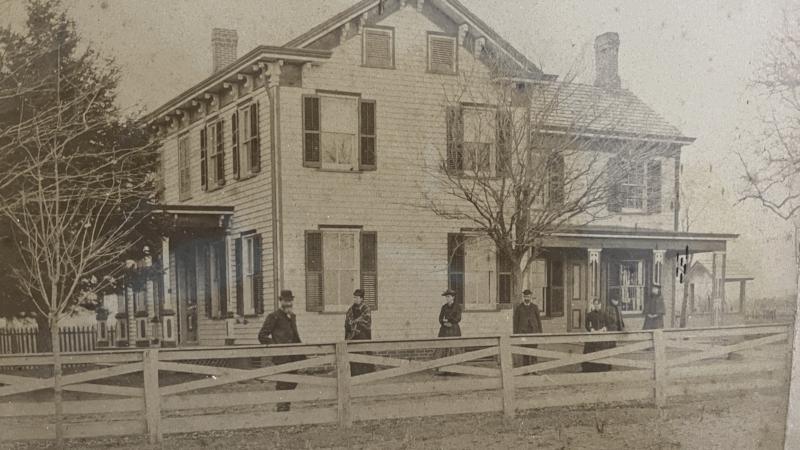New Jersey Town Tentatively Agrees to Not Seize 175-Year-Old Family Farm
After a nationwide uproar over Cranbury, New Jersey's plan to seize Andy Henry's farm, the township says it's found another site to place a planned affordable housing development.

The township of Cranbury, New Jersey, will not take Andy Henry's 175-year-old family farm for an affordable housing development after all.
According to a tentative agreement made public yesterday, the township has agreed to halt its eminent domain proceedings against Henry's farm while it awaits a state regulatory change that will open up an alternative site for affordable housing development.
While no formal agreement to stop the seizure has been reached yet, Cranbury Mayor Lisa Knierim said in a statement yesterday that the state's impending rule change (expected to be formalized by the end of the year) "creates a meaningful opportunity" to find another location for affordable housing that will let Henry keep his farm.
"This is something that we hope will work out favorably for all the parties involved. It's been a long way of getting here, and we're not done yet, but this is very encouraging," Henry tells Reason. "[I'm] definitely optimistic. More than if I'd talked to you a week ago."
The eminent domain saga surrounding Henry's farm began back in April, when the town informed Henry that it planned to seize his farm, which he co-owns with is brother, and convert it into a 130-unit affordable housing site.
Cranbury has insisted since the beginning that the seizure was a necessary means of meeting its obligations under New Jersey's fair share housing law. That law gives localities affordable housing quotas and then requires them to update their planning laws to meet those quotas.
From the get-go, Cranbury's attempted seizure was hotly controversial.
Henry's property is the only operative farm in what is now Cranbury's booming warehouse district. For years, he'd been turning down multiple, multi-million dollar offers from warehouse developers looking to redevelop his land into a logistics center as well.
His deep sentimental attachment to the property, which has been in his family since before the Civil War, made him unwilling to forfeit it to the township either.
"They saw this little patch of green out there and said, 'oh, we'll just snatch that up.' It's very disappointing to me," Henry says.
While New Jersey state law requires towns to plan for affordable housing, it does not require them to actually build that housing themselves, nor to seize property to facilitate affordable housing development.
Instead, they must show that they've amended their laws to create a "realistic opportunity" for enough affordable housing development.
Tim Duggan, Henry's attorney, told Reason back in June that the town could have satisfied that requirement through a number of other means, including upzoning other locations in town to allow for denser housing.
Fair housing advocates also weighed in against the seizure of Henry's farm. The purpose of New Jersey's fair share housing laws is not only to encourage affordable housing but to ensure that housing isn't all dumped in unsuitable locations.
The Fair Share Housing Center, a non-profit that works to enforce New Jersey housing law, argued in an administrative complaint that even if Cranbury could voluntarily purchase Henry's farm, they would still be proposing to place affordable housing in a warehouse district far from jobs, amenities, and services.
Despite these objections, the town insisted that the seizure of the farm was the only way it could comply with state law. In June, it submitted a housing element to the state that called for using eminent domain to take Henry's property.
Henry promptly countersued to block the seizure. A number of other groups, including the Fair Share Housing Center, also asked the state regulators to reject Cranbury's housing element.
While this legal process was unfolding, Cranbury's seizure efforts also attracted wide-ranging political opposition. New Jersey Gov. Phil Murphy weighed in against the seizure, as did Republicans in the state Legislature.
U.S. Secretary of Agriculture Brooke Rollins publicly opposed the taking of Henry's farm as well, and even appears to have donated to a GoFundMe in support of Henry's case.
This pressure eventually proved enough to get Knierim to back down. In September, she authored a letter to town residents saying that an alternative site to Henry's farm had been identified.
In order to make the site viable for affordable housing development, said the mayor, the state's housing finance agency needed to amend a rule forbidding affordable housing tax credits from being used to finance projects within 250 feet of existing warehouses.
Absent that rule change, Henry's farm was still at risk.
According to statements from both the mayor and Murphy issued yesterday, the state has started the process of amending its 250-foot warehouse rule. The rule making is anticipated to be finished by the end of the year, said Murphy.
Once that's complete, and the town's housing element is amended to reflect the change, Henry's farm will finally be safe from eminent domain.
Rent Free is a weekly newsletter from Christian Britschgi on urbanism and the fight for less regulation, more housing, more property rights, and more freedom in America's cities.


Show Comments (13)